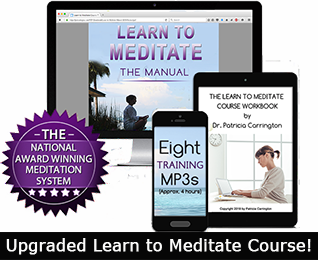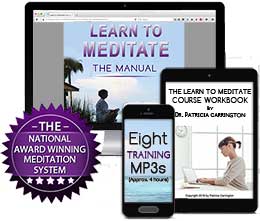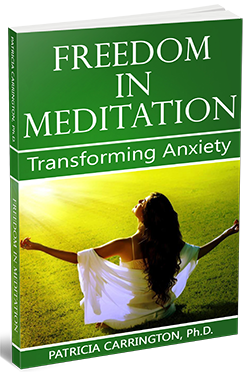Dr. Patricia Carrington describes the benefits of meditating first thing in the morning and in the late afternoon, while offering suggestions for those who are unable to mediate at those times.
Play Audio (Duration: 5 minutes 55 seconds)
Listen right now, or download for later. (To download, right click or control click the links)
This audio clip is excerpted from Dr. Patricia Carrington’s Learn to Meditate Course
Now, the next question has to do with your routine and what time during the day is really best for meditation.
An ideal time to meditate is first thing in the morning, before breakfast and before your morning cup of coffee, if you usually take coffee. If you meditate at this time, you want to, first, get out of bed and walk around a bit, and wash up, and then sit down to meditate.
Don’t meditate before getting out of bed, because you’ll simply fall back to sleep again, and while that will be very restful, it won’t be meditation.
Now, I know there are some people for whom it’s impossible to meditate first thing in the morning, because of some difficult time schedule, and it’s not absolutely necessary. But a lot of people find that they’re able to get up 20 minutes earlier than usual in order to get in this morning meditation, and that the meditation is so restful it seems to make up for the lost sleep.
Now, I’m often asked, by the way, why a morning meditation is needed in the first place when we’ve just been sleeping. Aren’t we thoroughly rested in the morning?
Actually, morning sleep is usually mostly dreaming sleep we have most of our dreams then and dreaming is not a restful state, it’s quite a restless one, so that the quieting effective meditation is often very welcome in the morning. But, I think the main reason it’s so valuable to meditate first thing in the morning is that this meditation sets a tone for the rest of the day. Instead of jumping up Suddenly and getting into harness quickly, when you hear the alarm, rushing into clothes, rushing to work or whatever needs to be done, you’re taking some quiet time with yourself. You’re being kind to yourself it’s a gentle quiet peaceful time, and it can make a difference in the whole rest of your day. You’re getting off to a very good start.
Now, if you miss the morning meditation, you can meditate mid-morning, or at lunch break before eating, and this is possible to do by the way even if you’re at work. Occasionally, I’ve even known certain women with young babies who simply couldn’t find time to meditate until the child took its afternoon nap. If this is the kind of schedule you have, then that’s when you should do your first meditation of the day.
Just keep in mind that you should put at least three to four hours space between your two meditations of the day. You can allow more time than that between them, if you wish, but spacing them apart is useful, because, this way, the quietness of meditation has a chance to affect the activity that follows it. And so, the next meditation comes when you really need it.
Now for your second meditation of the day, an ideal time is in the late afternoon, before dinner. I realize this is not possible for everyone. There’s some people who have to prepare dinner at that time, or who work then, but if you can meditate before dinner, say when you come home from work or from school or after the day’s chores, it’s extremely refreshing.
The late afternoon meditation seems to wash away the accumulated tensions of the day and gives you a second wind for the evening hours. A number of people have reported that it has literally given them back their lost evening time.
Now, if you can’t meditate in the late afternoon, for any reason, then you’ll have to wait until at least one hour after eating, and meditate in the early evening hours. Or, you may be one of those people who can meditate late in the evening and find this very satisfactory.
In a recent survey, I found that about 90% of meditators say they can meditate late at night, just before going to bed, and that they have a wonderfully restful sleep afterwards. An occasional person, however, reports that they feel very energized after meditating. They’re filled with a lot of creative energy. This may be very pleasant and they may do a creative project they’ve been putting off for months, but they’re not likely to get much sleep.
One woman recently told me that after meditating late at night, she suddenly found herself deciding to make draperies for the whole house. This was a job she’d been putting off for months. So she got out her sewing machine and she worked until about 5 a.m. with tremendous energy and she had loads of fun, but she didn’t get much sleep. So, if you’re one of these energizers, you don’t want to meditate late at night, unless you need to be alert.
It’s not absolutely necessary, by the way, to meditate at the same hours every day. It’s very nice if you can, but some people have to vary their meditation hour because of their work schedule. But you should be as regular as possible and don’t schedule in more than 2 meditations a day. I’ll explain the reason for this when we discuss the effects of over meditation in next week’s talk.
Now, when you decided which hours are the best times for you to meditate, fill in the meditation schedule in your booklet. This schedule gives you a basic plan to your meditation routine and helps you become regular in your practice.
 This easy-to-follow instruction kit contains downloads of the 8 audios, plus the Learn to Meditate Manual (PDF) and the Interactive PDF Workbook. Using this method you can master meditation within a week and feel its powerful effects at once. See complete details…
This easy-to-follow instruction kit contains downloads of the 8 audios, plus the Learn to Meditate Manual (PDF) and the Interactive PDF Workbook. Using this method you can master meditation within a week and feel its powerful effects at once. See complete details…






